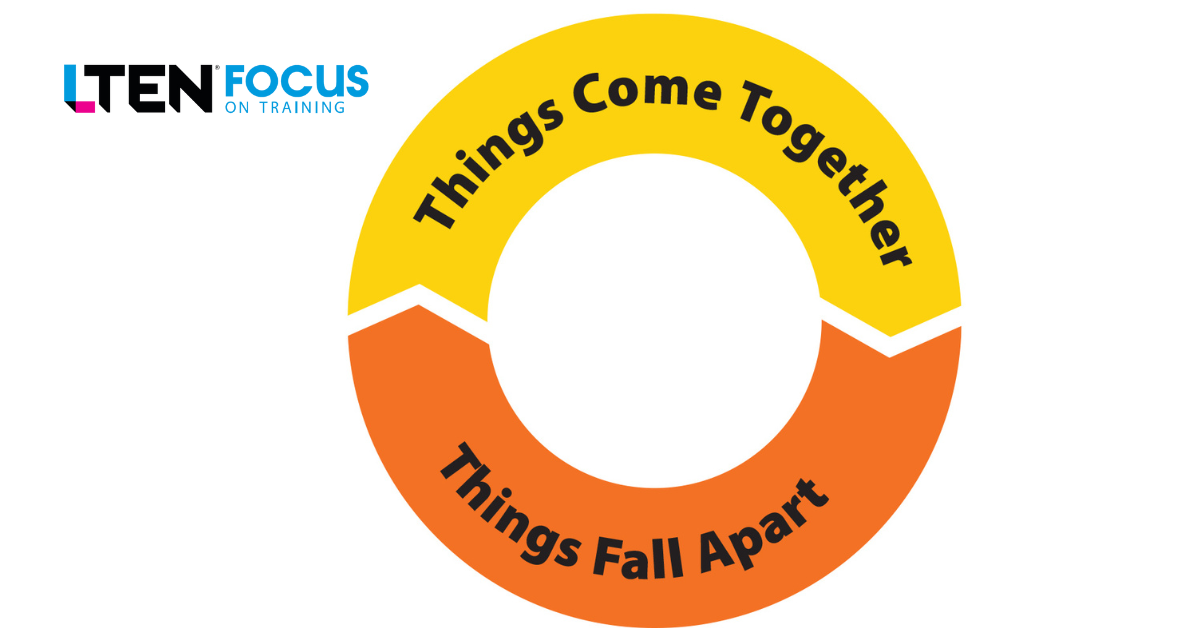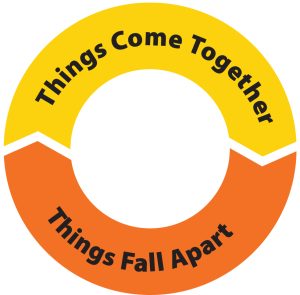
SOLUTIONS – Krishna C. Kalva
Be aware that things come together, and things fall apart
 One of my recent articles for LTEN Focus on Training magazine focused on the concept of interdependence and how the elements from our daily experiences are interdependent with one another. I want to apply some of the thoughts from that article toward a concept articulated by a prominent author.
One of my recent articles for LTEN Focus on Training magazine focused on the concept of interdependence and how the elements from our daily experiences are interdependent with one another. I want to apply some of the thoughts from that article toward a concept articulated by a prominent author.
The concept is about understanding the nature of reality.
A description of the nature of reality is to be aware that things come together, and things fall apart. Once we observe things as being interdependent – i.e., things are because of other things and things aren’t because other things aren’t – we understand that it is a cyclical nature of reality for things to come together and fall apart. Once we start seeing everything in life through the nature of reality, we obtain a perspective that offers clarity in our thought process.
The Dawn Challenge
I tried to reference the concept in my daily life toward a chore that I least enjoy — cleaning the dishes. A couple of years ago, I decided to change the relation I have with the chore.
On one occasion I decided to clean a pile of dishes lying in the kitchen. Just when I thought I had finished cleaning and didn’t have to do this again, I noticed a few more that needed to be cleaned. As I started to clean the remaining dishes, there was an inner voice telling me that things might appear to be temporarily over; however, the cyclical reality is that as we cook and eat, we also clean the dishes as it is continuous and never over.
The cyclical reality of cleaning the dishes can be referenced to the concept of things coming together and falling apart. Throughout the cycle, the experience we create depends on the intimacy we form with it, the relationship we form with the experience by being present and actively observing each moment as it unfolds. By being intimate, we lean into the experience that is unfolding without any preconceived perceptions or labels.
Being Vulnerable
Generally speaking, intimacy is formed when one is prepared to be vulnerable. The idea is to listen to the inner voice and remain present in the moment. By being present we enter the space of awareness and can observe the thoughts and emotions as separate from us. This applies to both positive and negative thoughts and emotions.
People tend to move closer to positive emotions and experience them more fully. However, that is not always the case with negative emotions, as we tend to avoid or push them away. By being prepared to be vulnerable, we lean into an emotion to participate and understand the message the emotion is trying to convey. We subconsciously interact with the emotion that helps create a perspective about the entire experience.
Working Together
Putting it in the context of professional lives, let’s look at the example of a strategic project. A team has come together to work on a project that requires close collaboration on multiple workstreams. After a successful onboarding, the team started to witness operational issues, thereby impacting the overall collaboration.
While trying to tackle the issues at hand, some members of the team practiced certain behaviors that were not collaborative, thereby drifting them away from finding a solution. After much deliberation a workshop was set up to discuss how collaboration could be improved as a team so the project could move ahead.
With the support of leadership, a trustful space was created to address all the pain points and mutually agree on the behaviors to be practiced. The workshop was considered a success as there was a general awareness created within the group toward one another and the root causes for the operational issue.
Once the team gained an understanding, they were prepared to be vulnerable. That opened the doorway to actively participating and solving issues by applying unique skill sets and experiences. By remaining vulnerable, the team members developed intimacy and acceptance toward the topic and gained a new perspective about the situation at hand. Should the issue recur in the future, they now have the collectively gained wisdom to move ahead.
Conclusion
I want to take your attention back to the original idea, understanding the nature of reality. Through moments like joy, happiness, challenges, etc., we can reflect upon the thoughts and emotions in our minds. Once there is awareness created about a given situation, there is more clarity in our thought patterns and the relationship we form with them.
We come to the profound realization that things come together, and things fall apart — such is the nature of reality. And the reality is that everything in life, both personal and professional, is interdependent and subject to change.
Once we understand the nature of reality, we create experiences that are unique and meaningful.
 Krishna C. Kalva is learning solution manager at Siemens Healthineers. Email him at krishnachaitanya.kalva@siemens-healthineers.com.
Krishna C. Kalva is learning solution manager at Siemens Healthineers. Email him at krishnachaitanya.kalva@siemens-healthineers.com.








